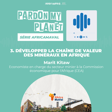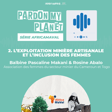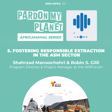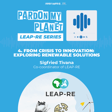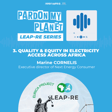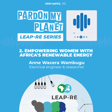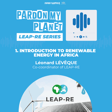Become a Creator today!Start creating today - Share your story with the world!
Start for free
00:00:00
00:00:01

Geopolitics in critical minerals in africa
This episode provides us with essential background information on the geopolitics of critical minerals and highlight the importance of the EU developing partnerships with resource-rich countries.
Transcript
Introduction and Episode Focus
00:00:11
Speaker
Hello, and welcome to Pardon My Planet podcast. I'm Angela, the host. This is a new episode of Bridging Continents, the Africa-Europe partnerships of critical raw materials. Today, we'll discuss why the European Union's need for critical raw materials, known as CRMs, is more pressing than ever, and how this dependency shapes strategic partnerships with with those rich countries like those in Africa.
00:00:39
Speaker
As global demand for essential materials like lithium and where earth metal skyrockets, Europe must navigate challenges in supply chains, geopolitics, and fair collaboration to secure its future. We welcome today some Whittlesey Sustainable Innovation Strategies, or LGI, and part of the Africa Maval Project. It's a European project dedicated to building EU-Africa partnerships on sustainable raw materials value chain.
00:01:08
Speaker
Hello, Sam. Hello, Angela. Thank you for being here and answering our questions. Yeah, I'm really glad to be here. Thank you. And ah so maybe our first question will
Importance and Challenges of Critical Raw Materials
00:01:18
Speaker
be today. ah Why does the EU need so badly the critical raw materials? um I think maybe to answer that, it's helpful to think a little bit about what the definition of a critical raw material is.
00:01:33
Speaker
So it's been over a decade now that the EU has published its list of critical raw materials. And um what those materials are are materials that have been determined to be both essential for the European economy and also facing certain risks in terms of their supply. So there's a component of looking at the demand for the material and then looking at the supply. And so A lot of those materials are um different materials that Europe has determined to be essential to meeting its energy transition goals.
00:02:05
Speaker
so um materials like cobalt, lithium, then you have kind of other minor metals that are also really important for certain specific technologies where you can't easily develop that technology without that specific material. So thinking about like tellurium, germanium, iridium, metals that we don't normally think about in our day-to-day life, but that are really essential for certain specific technologies that are high performance. And then on the supply side,
00:02:33
Speaker
ah you have this question of risk. And so what that really means to kind of boil things down is that there's a few countries around the world that have a very high share of production of some of these specific materials. So there's a risk that due to geopolitical issues or other possible supply chain disruptions,
00:02:54
Speaker
Europe's economy could be at risk if supply and access to those
Potential Consequences of CRM Shortages
00:02:59
Speaker
materials is cut off. What happens concretely if Europe is cut from critical raw materials? Because its own land, let's say in Europe, we don't have so much to to provide. What would happen if we are completely cut off? Let's take for example what happened in 2011 when the discussion around critical materials really started to take off.
00:03:20
Speaker
ah So, specifically, there's a certain group of elements on the periodic table. They're called rare earth elements. It's the lanthanides that you see at the bottom of the periodic table. And those materials are very useful for a wide range of high performance technologies, specifically um permanent magnets and the high performance magnets that we need to power electric vehicles and also to power wind turbines.
00:03:46
Speaker
China has a near total monopoly on the production, the separation of those different materials and the production of high purity rare earth elements ah for ah different technologies, especially magnets. And so in 2011, what happened was the the Chinese government decided to limit the export of those materials to the rest of the world. And what you saw was that prices for ah Basically all rare earth elements ah went up over 15 times overnight. And so that poses a serious risk to European industry. So you can imagine, for instance, if you're a wind turbine producer and all of a sudden now the material that's going into the magnets in your wind turbines have been ah disrupted.
00:04:31
Speaker
or you're having to pay 15 times more for that same material. They cannot keep up. They can't keep up on the global market and it could potentially ah lead to the industrialization of Europe. So Europe is very dependent on CRM, as you just explained. How does it influence the decisions and the priorities that EU put in place to make sure that the CRMs are secured?
Legislative Efforts: Critical Raw Materials Act
00:04:54
Speaker
Yeah, I think initially there was a phase of ah Europe becoming aware exactly how dependent the continent was on ah imports of certain strategic materials. And now we're passing from this awareness into ah more of a phase of taking concrete actions. And I think especially um the supply risk became really apparent during the COVID crisis. And then also the war in Ukraine has also really kind of woken up political stakeholders.
00:05:24
Speaker
um And so what that has led to is a series of different legislative acts that have been passed by Europe and the most notable of those is the Critical Raw Materials Act. So the Critical Raw Materials Act went into force at the beginning of this year.
00:05:39
Speaker
And it lays out a series of different policy mechanisms at the European level to reduce dependence of Europe on specific third-party countries. So the threshold they set is no more than 65% of European supply of any critical raw material can come from one single other country. The goal is to really diversify supply as much as possible.
00:06:01
Speaker
um And to accomplish that, there's a wide range of different actions, so ah some of that starts with facilitating the opening of new mines within Europe, also looking to advance refining in within Europe, looking to advance recycling as much as possible within Europe. ah But all of those different goals are limited by the fact that there's a limited amount of deposits of some of these materials in Europe, so there's just not those materials present within the ground necessarily, um and other economic constraints as well as the attitude of Europeans to living next to some of these sites also poses some risks. So what ah the Critical Raw Materials Act also allows for is designating strategic projects, which will receive support from the European Commission to actually get developed, get permitted more quickly.
00:06:53
Speaker
ah get financial support. Also, they support them with receiving offtake agreements where you have downstream industry that will make an agreement to purchase the material once it's been brought onto the market.
EU-Africa Partnerships: The Africa Maval Project
00:07:03
Speaker
And then there's a lot of work around um what they're calling strategic partnership countries. And so ah Europe is signing bilateral agreements with specific countries around the world.
00:07:15
Speaker
where they agree to ah collaborate on win-win scenarios to develop new supply of ah critical raw materials in a way that is hopefully going to be a fair partnership both for the country that is supplying the material and also for Europe that needs these materials for for their industry.
00:07:33
Speaker
And it's in this context that the project Africa Maval in which you are working in is developed, right? Exactly. So Africa Maval is a Horizon Europe project that is looking to um support Europe in achieving the goals of the Critical Wrong Material Act, specifically by creating new supply of critical minerals across the African continent and looking to develop win-win partnerships across the entire value chain ah to integrate African industry with European industry.
00:08:03
Speaker
You mentioned the Critical Role Material Act. Are there any upcoming policies as well that you have seen that will help secure ah even more this Critical Role Material value chain? Yeah, so there's ah some policies that have also been implemented this year that I think will be really key to increasing security of supply for Europe.
Securing CRM Supply Chains: EU Battery Regulation
00:08:27
Speaker
So another one that was has gone into force this year is the EU battery regulation. So that was amended and is entering into force now. But all of the different protocols of the regulation are coming into force progressively over the next few years.
00:08:41
Speaker
So that has a lot of really interesting components as well related to Europe's energy sovereignty and the different requirements that will be ah put in place on ah battery producers to make sure that they have resilient supply chains. So some of those include um the development of a new battery passport. So they're looking to ensure that every new electric vehicle that's sold in Europe will come with a product passport where the consumer can be informed about where the materials within their battery are coming from. And there will be specific requirements to demonstrate to consumers and also to regulators that those materials are sourced in a sustainable way, in a low carbon way, ah in a way that's respectful of human rights, et cetera. And then the legislation also has a lot of components related to enabling repurposing, reuse, and recycling of batteries at the end of life.
00:09:38
Speaker
And that can also be a really strong enabler of Europe's long-term independence in terms of supply of these different materials. If we circle back to what you said about China having, let's say, a neo-monopoly on the many of those buts aspects of the critical raw materials value chain, I guess it's not the only player also in the world regarding that matter. That a whole context must create geopolitical tensions as well. What are these type of tensions and what are the solutions that can be implemented to avoid this?
China's Dominance in CRM Market and Its Implications
00:10:15
Speaker
I think to answer that, it's interesting to again, think a little bit about how we got to where we are now. And so if you look at the last 40, 50 years and the the rise of China as a global player, geopolitically, and also the emergence of
00:10:34
Speaker
like China's industrial economy. What you see is that in the 80s, the 90s, several decades ago, Western countries, so in North America and Europe, um were not necessarily so concerned about exporting the production of raw materials to third party countries. And that's because oftentimes mining and refining come with environmental and social consequences.
00:10:56
Speaker
And so this was seen as kind of like a dirty business. And I think that it was actually convenient for the West to export this ah elsewhere and kind of out of sight, out of mind, I think was more of the attitude at that time. And what the Chinese were able to do during that time period, if we just look at rare earths again, was begin by developing new extraction of these materials. So they have some of the largest rare earth mines in inner Mongolia, and then to really Start from extraction and then slowly work their way up the value chain in terms of developing the capacities and the skills within their country to go from. Merely extracting the material to processing it refining it making it high purity and then in the last decade or so what we've seen is that China has really taken.
00:11:43
Speaker
a very strong position in the global market in the technologies that we need for the the energy transition. So if you look at electric vehicles, lithium ion batteries, ah solar panels, wind turbines, all of these technologies are produced at a really massive scale in China at a much lower cost than they can be produced in the West. right I think Western governments were a bit late in realizing what was happening, because like I said, it was something that was kind of politically convenient and until it wasn't.
00:12:12
Speaker
And now there's been kind of like a wake up call, I would say in the past few years, like I said earlier, especially I think since the war in Ukraine, ah there's been kind of a rising awareness that ah the economy of the future will um be dependent on these different technologies that are produced almost exclusively for some, in some cases in China. And so ah that's led to kind of like a polarization in the world. Some people talk about like a new cold war, for instance, where you see on the one hand,
00:12:41
Speaker
countries in the West, the OECD countries, the so for instance, the United States, Canada, the European Union aligning into some sort of block on one
Global Efforts and Policies for CRM Security
00:12:52
Speaker
side. And then you have on the other hand, organizations like the BRICS. So that's Brazil, Russia, India, South Africa, and also different model of globalization that's led by China. And they have their own specific policy, which is the Belt and Road Initiative, which is looking to kind of invest in infrastructure. And oftentimes you you have these deals where it's explicitly made clear that there's an investment in infrastructure in exchange for raw material.
00:13:16
Speaker
Yeah, that's kind of how we arrived at where we are now. And then what we're seeing is that a lot of countries are now waking up to the essential role of critical minerals empowering the economy of the future. And so you have a lot of new initiatives that are emerging right now. And so on one hand, you have, for instance, partnership called the Mineral Security Partnership that's established between some of the countries that I mentioned earlier. So The United States, Canada, Australia, and the European Union have all formed one kind of block where they are also looking to include resource-rich countries into those discussions and collectively pool their resources to invest in strategic projects around the world. Then you also have other other players around the world that are also looking to invest in critical minerals at a political scale. So you also have Saudi Arabia, for instance, that has recently announced large new public fund investing in critical raw materials.
00:14:10
Speaker
ah They've also created a state run mining company that's kind of modeled after their state run oil company Aramco. You have a large global mining conference that's now being organized every year in Riyadh. And then you have even other players like South Korea as well has their own fund for critical raw materials that they've announced.
00:14:30
Speaker
What this is producing is kind of a new world order where you have kind of two big blocks on either side, but then within that, quite a lot of diversity in terms of the different players and their different strategic interests in securing these materials.
00:14:43
Speaker
Because, like I said, access to these materials is essential for then developing all the rest of the downstream industry for the technologies of the future.
Addressing Colonial History in EU-Africa Collaborations
00:14:52
Speaker
So ah regarding in in all what you said that what Europe is is doing to make sure they have a place, you know, in those discussions,
00:15:01
Speaker
There is also an aspect that we cannot ignore that is the history that we have between Europe and Africa. We have this colonial history. How do we take it into account? How do make we make sure that the partnership is fair? And how does this history so it's taken into account and how does it play in the partnership that we're trying to make?
00:15:23
Speaker
I think it's kind of the elephant in the room when we talk about, for instance, Africa Mabel to an African stakeholder. It's really the first thing that comes to their mind when you tell them that ah European industry and companies are looking to secure access to raw materials in Africa is obviously the history of colonialism.
00:15:40
Speaker
and neocolonialism that came after that as well. I think there's a few ways to respond to that. The first is by, like you just did, really being transparent, open, and honest about the history and what took place in the way that yeah there's a long history of exploitation of of African countries, just purely for profit.
00:16:02
Speaker
I think maybe Europe still has some more work to do on fully acknowledging that history. And I think the current political climate isn't necessarily the best suited to accomplishing that. But beyond acknowledging the history there and trying to kind of reconcile with it, I think that it's really essential that if Europe does want to enter into these agreements,
00:16:25
Speaker
And specifically wants to do that in a context where they are not the only player that's coming to offer funding for for producing these materials. They need to have a better argument than, for instance, Chinese producers might. And that involves first and foremost, listening to local stakeholders and developing partnerships that are genuinely a win-win.
00:16:51
Speaker
And that means, for instance, ensuring that local communities are consistently involved in the entire development of any new mining site, refining site, or any sort of material production. That you have agreements in place for the community development agreements or things like that, where revenue that's generated by these projects returns first and foremost to the communities that are impacted by them.
00:17:14
Speaker
that there are strong frameworks in place in the company in the countries that these projects are going to be developed to make sure that the the revenue and the taxes that are generated from these projects also benefit the development of those countries. Then you need to make sure that that we're not just looking at the old colonial model of extracting the resource in its raw form and then only developing infrastructure to make sure that that resource can be exported and then the value can be created outside of the continent. So what's really essential is investing progressively in developing countries around the world and allowing them to add value
00:17:54
Speaker
in those countries themselves. So that means making sure that they have the necessary skills and whether that's engineering skills or processing skills, ah the necessary technology and that comes with a whole question of intellectual property rights as well. And it also means investing in the other types of infrastructure than just the mine site itself.
00:18:15
Speaker
to make sure that a whole industry can develop. And that means, for instance, investing in energy infrastructure, investing in roads and transportation networks, rail lines. All of this is a way that Europe can kind of offer a competing model to what other countries are proposing, where it's really about ah the long-term development of these countries and acknowledging that when they benefit, ah Europe also benefits. And it doesn't have to be a winner and a loser, but it can be really win-win.
Episode Conclusion and Future Content
00:18:45
Speaker
And talking about this, we will ah have an episode with Zendaya Wasis from the Association of Women in Mining in Africa. We will talk about environmental, social and governance aspects that you are also covering in the Africa, in the Africa MML project. From what I understand and what we hear today is that this aspect is really the key difference for Europe comparing to all the other players around the the table.
00:19:12
Speaker
Yeah, I think it can be a big part of Europe's value proposition when they're going to engage with stakeholders in Africa or else elsewhere. Well, thank you very much, Sam, for your time and ah answering our questions today. The other episodes of this series and all the episodes of Pardon My Planets are available on Spotify and Apple Podcasts. They are also available at lgi dot.earth slash podcast. Until next time. Bye-bye.
